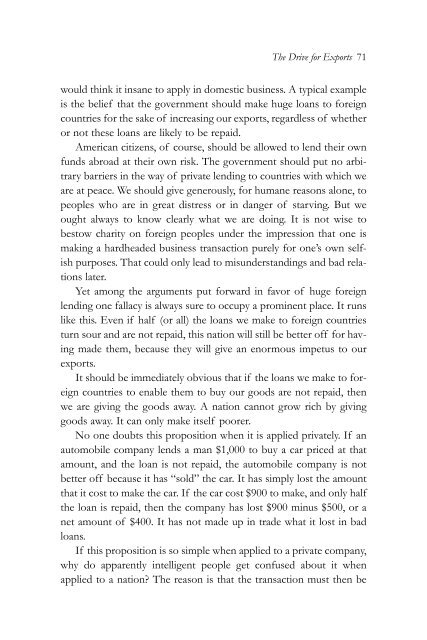1gDdM7w
1gDdM7w
1gDdM7w
- No tags were found...
You also want an ePaper? Increase the reach of your titles
YUMPU automatically turns print PDFs into web optimized ePapers that Google loves.
The Drive for Exports 71would think it insane to apply in domestic business. A typical exampleis the belief that the government should make huge loans to foreigncountries for the sake of increasing our exports, regardless of whetheror not these loans are likely to be repaid.American citizens, of course, should be allowed to lend their ownfunds abroad at their own risk. The government should put no arbitrarybarriers in the way of private lending to countries with which weare at peace. We should give generously, for humane reasons alone, topeoples who are in great distress or in danger of starving. But weought always to know clearly what we are doing. It is not wise tobestow charity on foreign peoples under the impression that one ismaking a hardheaded business transaction purely for one’s own selfishpurposes. That could only lead to misunderstandings and bad relationslater.Yet among the arguments put forward in favor of huge foreignlending one fallacy is always sure to occupy a prominent place. It runslike this. Even if half (or all) the loans we make to foreign countriesturn sour and are not repaid, this nation will still be better off for havingmade them, because they will give an enormous impetus to ourexports.It should be immediately obvious that if the loans we make to foreigncountries to enable them to buy our goods are not repaid, thenwe are giving the goods away. A nation cannot grow rich by givinggoods away. It can only make itself poorer.No one doubts this proposition when it is applied privately. If anautomobile company lends a man $1,000 to buy a car priced at thatamount, and the loan is not repaid, the automobile company is notbetter off because it has “sold” the car. It has simply lost the amountthat it cost to make the car. If the car cost $900 to make, and only halfthe loan is repaid, then the company has lost $900 minus $500, or anet amount of $400. It has not made up in trade what it lost in badloans.If this proposition is so simple when applied to a private company,why do apparently intelligent people get confused about it whenapplied to a nation? The reason is that the transaction must then be


